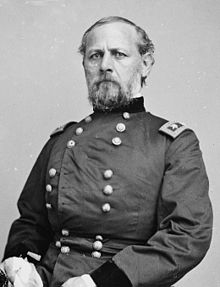Don Carlos Buell
Don Carlos Buell (born March 23, 1818 near Marietta , Ohio , † November 19, 1898 in Rockport , Kentucky ) was an American officer who fought in the Seminole War , the Mexican-American War and the War of Civil War.
overview
Buell was born near Marietta, Ohio and lived in Indiana for a period before the Civil War . He graduated from the US Military Academy in 1841 and became a lieutenant in the 3rd US Infantry. In the Mexican-American War he served under Generals Zachary Taylor and Winfield Scott . He was promoted three times for valor and wounded at the Battle of Churubusco . Between the wars, he served on the General Staff and as an adjutant in California .
Civil War
At the beginning of the Civil War he helped organize the Army of the Potomac and eventually commanded one of its divisions . In November 1861 he followed William T. Sherman as head of the military district of Ohio (inter alia responsible for the Army of the Ohio ) to direct military operations in eastern Tennessee . This area was Union-friendly and was considered politically important to win the war. Buell, however, ignored his orders and instead attacked Nashville , which he captured on February 25, 1862 without much resistance. Confederate forces were not in the area at the time, as they resisted Ulysses S. Grant at Fort Henry and Fort Doneldson (see Battle for Fort Donelson ). On March 21, Buell was promoted to major general of the Volunteers.
In the battle of Shiloh on 6/7. April 1862 he hurried with his army to the aid of General Grant's Tennessee Army and defeated the Confederate Mississippi Army with this . Buell assumed that his appearance saved Grant from suffering a decisive defeat. Seeing the matter differently, Grant launched a campaign against him that was not conducive to Buell's career. During the Battle of Corinth in May 1862, Buell fought under Henry Wager Halleck . In June and July, Buell began a four-division march into Chattanooga . His supply lines were interrupted by Confederate cavalry under Nathan Bedford Forrest near Murfreesboro and the offensive stopped.
Buell got into more and more political difficulties during this time. Some Union supporters spread that Buell was a sympathizer of the South because he was one of the few Union officers who had once owned slaves himself. (He had taken eight slaves from his wife's family.) His instructions during the military operation in Tennessee and Alabama to be considerate of civilians in the south also caused him new anger. The scandal came when the city of Athens in Alabama was sacked by Union soldiers on May 2, 1862 . The commanding officer, John Basil Turchin , was blamed and charged by Buell. This led to heated political discussions that led President Abraham Lincoln to replace Buell with General George H. Thomas on September 30, 1862 . But he refused to take over the post and Buell kept his command. John B. Turchin was sentenced to retire from the army but reinstated by the War Department and promoted to brigadier general.
In August 1862, Confederate General Braxton Bragg and Edmund Kirby Smith attacked Kentucky , and Buell was forced to retreat north to the Ohio River to protect Louisville . The Confederate "Heartland" offensive was then stopped on October 8, 1862, when Buell and Bragg fought the undecided battle of Perryville . Bragg then withdrew to Tennessee without Buell pursuing him. Because of this decision, Buell was removed from command on October 24, 1862 and William S. Rosecrans took over the troops renamed the Cumberland Army .
Retirement from military service
For the next year and a half, Buell went unnoticed in Indianapolis . He hoped that a commission would rehabilitate him. In his opinion, the only reason he hadn't pursued Bragg was because the supplies of his troops were not secure. In fact, he received only a mild reprimand, but was discharged from military service on May 23, 1864 at his own request. He had been offered a position on the mediation of General Grant to serve under Sherman or Canby , but since Buell was higher in rank than these two, he declined. Grant called this decision in his memoir: "... the worst excuse a soldier can have for retirement."
post war period
After the war, Buell lived in Indiana and then in Kentucky and worked in the coal and iron industries. He became president of the Green River Iron Works. He died in Rockport, Kentucky, in 1898 and was buried in Bellefontaine Cemetery in St. Louis , Missouri .
literature
- Stephen D. Engle: Don Carlos Buell: The Most Promising of All . Chapel Hill, NC 1998.
Web links
- Don Carlos Buell in the database of Find a Grave (English)
| personal data | |
|---|---|
| SURNAME | Buell, Don Carlos |
| BRIEF DESCRIPTION | American officer |
| DATE OF BIRTH | March 23, 1818 |
| PLACE OF BIRTH | near Marietta , Ohio |
| DATE OF DEATH | November 19, 1898 |
| Place of death | Rockport , Kentucky |
